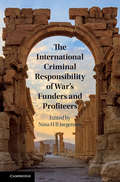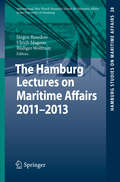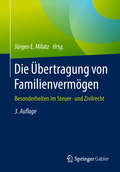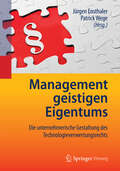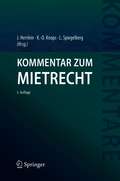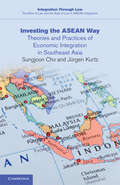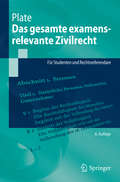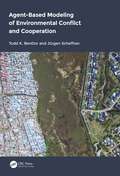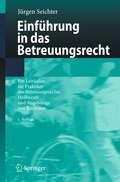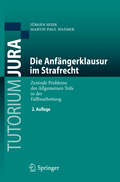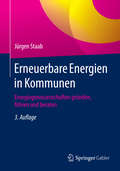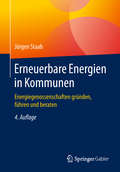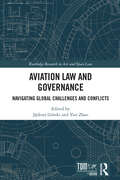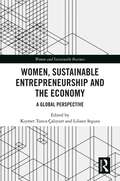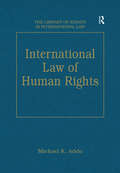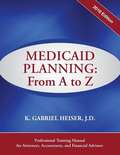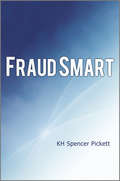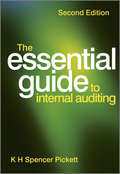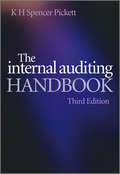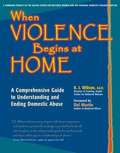- Table View
- List View
The International Criminal Responsibility of War's Funders and Profiteers
by Jørgensen, Nina H. B.This book is concerned with the commercial exploitation of armed conflict; it is about money, war, atrocities and economic actors, about the connections between them, and about responsibility. It aims to clarify the legal framework that defines these connections and gives rise to criminal or, in some instances, civil responsibility, referring both to mechanisms for international criminal justice, such as the International Criminal Court, and domestic systems. It considers which economic actors among individuals, businesses, governments and States should be held accountable and before which forum. Additionally, it addresses the question of how to recover illegally acquired profits and redirect them to benefit the victims of war. The chapters shine a critical light on the options provided by a network of laws to ensure that the 'great industrialists' of our time, who find economic opportunities in the war-ravaged lives of others, are unable to pursue those opportunities with impunity.
The Hamburg Lectures on Maritime Affairs 2011-2013
by Jürgen Basedow Ulrich Magnus Rüdiger WolfrumIn 2007, the International Max Planck Research School for Maritime Affairs together with the International Tribunal for the Law of the Sea (ITLOS), both based in Hamburg, decided to establish an annual lecture series, the "Hamburg Lectures on Maritime Affairs" - giving distinguished scholars and practitioners the opportunity to present and discuss recent developments in this field. The present volume - the third in the series - collects the lectures held between 2011 and 2013 inter alia by Andrew Dickinson, Yvonne Marie Dutton, Bevan Marten, Andreas Maurer, Irini Papanicolopulu, aslav Pejovic, Juan L. Pulido, Andrés Recalde Castells, Thomas J. Schoenbaum and Rüdiger Wolfrum.
Die Übertragung von Familienvermögen
by Jürgen E. MilatzZu unterschiedlichen Zeitpunkten und aus verschiedenen Anlässen stellen sich, insbesondere aufgrund aktueller wirtschaftlicher und steuerlicher Entwicklungen, für viele Privatpersonen teils sehr komplexe Fragen ihrer Vermögensnachfolge. Die Übertragung von Vermögenswerten wie Immobilien, Gesellschaftsanteilen oder Kapitalvermögen innerhalb der Familie ist eine Maßnahme, um sich, Ehepartner und die nachkommenden Generationen zu versorgen und das Familienvermögen zu sichern. Die Übertragung zu Lebzeiten ermöglicht dabei oft eine gezieltere Steuerung als im Erbfall. Mit vielen Beispielen und Hinweisen zur Steueroptimierung werden die zahlreichen infrage kommenden Übertragungsformen von Privatvermögen an Familienangehörige zu Lebzeiten erläutert.Für die 3. Auflage wurde das Buch überarbeitet und umfassend aktualisiert.
Management geistigen Eigentums
by Jürgen Ensthaler Patrick WegeDas Management geistigen Eigentums spielt eine wichtige Rolle für den Unternehmenserfolg und ist deshalb als eine eigenständige unternehmerische Aufgabe zu betrachten. Aufbauend auf den Gebieten Rechtswissenschaft, Betriebswirtschaft, Managementlehre und Ingenieurswissenschaft, erfordert sie eine interdisziplinäre Herangehensweise. Die Frage der Interdisziplinarität für das Management geistigen Eigentums wird in diesem Buch erstmals behandelt. Außerdem werden rechtswissenschaftliche Aspekte in Managementmodellen konsequent berücksichtigt.
Kommentar zum Mietrecht
by Kai-Oliver Knops Lea Spiegelberg Jürgen HerrleinDer von einem Team aus Praktikern und Wissenschaftlern gemeinsam erarbeitete Kommentar behandelt das gesamte Recht der Wohnungs- und Geschäftsraummiete. Das Werk eignet sich vor allem für die Fallbearbeitung durch Rechtsanwälte, Richter und andere Praktiker, vernachlässigt dabei aber nicht die wissenschaftliche Durchdringung der Materie.Die Besonderheiten des Mietprozesses, der Räumungsvollstreckung und der mietrechtlichen Bezüge des Steuerrechts sind in ausführlichen Kapiteln ebenso erläutert wie die mietrechtlichen Teile des Wirtschaftsstrafgesetzes.Damit liefert der „Herrlein/Knops/Spiegelberg“ auch in der 5. Auflage einen praxisorientierten Leitfaden und setzt das bewährte Konzept der Vorauflagen fort: Ausführliche, aber dennoch übersichtlich strukturierte Kommentierungen mit den notwendigen dogmatischen Erläuterungen werden kombiniert mit praktisch anwendbaren Informationen.
Investing the ASEAN Way: Theories and Practices of Economic Integration in Southeast Asia (Integration through Law:The Role of Law and the Rule of Law in ASEAN Integration #19)
by Sungjoon Cho Jürgen KurtzIn recent decades, South East Asia has become one of the world's most popular destinations for foreign investment. The member states of the Association of Southeast Asian Nations (ASEAN) have employed varying modalities to pursue first security and then economic cooperation. This book explores regional law and governance in ASEAN through the lens of its regulation of foreign investment. It adopts a new framework to identify the unique ontological autonomy of the ASEAN Investment Regime beyond a simple aggregation of its individual member states. It deploys a sociology-led approach (especially constructivism) and emphasizes ideational factors (such as culture and norms) that guide state actions from within. The book explores the manner in which ASEAN's history and culture have fundamentally shaped its foreign investment policies, leading to outcomes that often depart fundamentally from the external structure and script of Global Investment Law.
The WTO and International Investment Law Converging Systems (Cambridge International Trade and Economic Law)
by Jürgen KurtzInternational law has historically regulated foreign trade and foreign investment differently. Distinct evolutionary pathways have led to variances in treaty form, institutional culture, and dispute settlement. With their inevitable erosion through the late twentieth to early twenty-first centuries, those weak boundaries have become porous and indefensible. Powerful economic, legal and sociological factors are now pushing the two systems together. In this book, Jürgen Kurtz systematically explores the often complex and little-understood dynamics of this convergence phenomenon. Kurtz addresses the growing connections between international trade and investment law, proposing a theoretically grounded and doctrinally tractable framework to understand the deepening relationship between them. The book also offers reform ideas and possibilities, providing treaty negotiators and other government officials with a set of theoretical insights and doctrinal models that can guide actors in building a justifiable and sustainable level of commonality between the two legal systems. Proposes a new understanding of the relationship between international trade and investment law Offers theoretical justifications for levels of convergence between the two regimes and expands the potential readership base beyond law to other disciplinary areas Identifies vectors by which both legal regimes may achieve systemic maturation and will appeal to treaty negotiators and policy makers who are seeking to reform both systems
Das gesamte examensrelevante Zivilrecht: Für Studenten und Rechtsreferendare (Springer-Lehrbuch)
by Jürgen PlateDieses Lehrbuch vermittelt Studenten und Referendaren durch eine inhaltlich kurz gefasste, von keiner einzigen Fußnote unterbrochenen Darstellung das gesamte für das Studium und für die beiden Examina erforderliche zivilrechtliche Wissen und schult zugleich das Verständnis für die Zusammenhänge. Eingearbeitet sind über 800 Fälle mit exakt gegliederten Lösungsskizzen. Die Gliederung des Buches orientiert sich an den Aufbauerfordernissen einer Fallbearbeitung. In den Text integrierte Wiederholungen festigen ständig das Wissen. Das Buch unterscheidet sich von anderer Ausbildungsliteratur dadurch, dass es weitestgehend auf die aufwendige Darstellung wissenschaftlicher Kontroversen verzichtet und entsprechend der Examenswirklichkeit die Bedeutung des Gesetzes für die Fallbearbeitung in den Mittelpunkt stellt.
Erfinderhandbuch: Innovations- und Patentmanagement für Erfinder, Ingenieure und mittelständische Unternehmen
by Jürgen R. Dietrich Thomas Heinz MeitingerDieses Fachbuch möchte es dem Leser ermöglichen, das Innovationsmanagement und den gewerblichen Rechtsschutz für sein Unternehmen vorteilhaft anzuwenden. Aus der Praxis der Autoren als Hochschuldozenten, Leiter Patentwesen und Patentanwalt wissen sie, dass dies keine Selbstverständlichkeit ist. Dabei liegt es nicht immer an der Qualität der Erfindung. Offensichtlich ist mehr erforderlich als eine gute Idee, damit ein Unternehmen wertvolle Patente erhalten kann. Patente sind ein gebräuchliches und bewährtes Instrument zum Schutz von Erfindungen und Innovationen, und haben damit einen entscheidenden Einfluss auf den Erfolg eines Unternehmens. Der qualifizierte Umgang mit dem Innovationsmanagementprozess und den gewerblichen Schutzrechten ist daher eine Kernaufgabe des innovativen, technologieorientierten Unternehmens. Dabei hat das Innovations- und Patentmanagement zahlreiche interdisziplinäre Aufgaben im rechtlichen, wirtschaftlichen und technischen Umfeld zu bündeln und zu koordinieren. Dieses neue Fachbuch soll als kompakter Leitfaden dem Erfinder, Ingenieur und dem KMU in übersichtlicher Form dazu Hilfestellung geben.
Agent-Based Modeling of Environmental Conflict and Cooperation
by Jürgen Scheffran Todd BenDorConflict is a major facet of many environmental challenges of our time. However, growing conflict complexity makes it more difficult to identify win-win strategies for sustainable conflict resolution. Innovative methods are needed to help predict, understand, and resolve conflicts in cooperative ways.Agent-Based Modeling of Environmental Conflict and Cooperation examines computer modeling techniques as an important set of tools for assessing environmental and resource-based conflicts and, ultimately, for finding pathways to conflict resolution and cooperation. This book has two major goals. First, it argues that complexity science can be a unifying framework for professions engaged in conflict studies and resolution, including anthropology, law, management, peace studies, urban planning, and geography. Second, this book presents an innovative framework for approaching conflicts as complex adaptive systems by using many forms of environmental analysis, including system dynamics modeling, agent-based modeling, evolutionary game theory, viability theory, and network analysis. Known as VIABLE (Values and Investments from Agent-Based interaction and Learning in Environmental systems), this framework allows users to model advanced facets of conflicts—including institution building, coalition formation, adaptive learning, and the potential for future conflict—and conflict resolution based on the long-term viability of the actors’ strategies.Written for scholars, students, practitioners, and policy makers alike, this book offers readers an extensive introduction to environmental conflict research and resolution techniques. As the result of decades of research, the text presents a strong argument for conflict modeling and reviews the most popular and advanced techniques, including system dynamics modeling, agent-based modeling, and participatory modeling methods. This indispensable guide uses NetLogo, a widely used and free modeling software package, to implement the VIABLE modeling approach in three case study applications around the world. Readers are invited to explore, adapt, modify, and expand these models to conflicts they hope to better understand and resolve.
Einführung in das Betreuungsrecht: Ein Leitfaden für Praktiker des Betreuungsrechts, Heilberufe und Angehörige von Betreuten
by Jürgen SeichterDas Buch bietet eine gründliche, auch ohne Vorkenntnisse gut verständliche Darstellung des Betreuungsrechts. Es wird durch viele Fälle aus der langjährigen richterlichen Praxis des Verfassers illustriert. In der 4. Auflage sind die Änderungen eingearbeitet, die sich aus dem Inkrafttreten des Gesetzes über das Verfahren in Familiensachen und in den Angelegenheiten der freiwilligen Gerichtsbarkeit (FamFG) am 1.9.2009 ergeben, sowie das neue Gesetz über die Verbindlichkeit von Patientenverfügungen. Insgesamt wurde der Inhalt aktualisiert und gestrafft.
Die Anfängerklausur im Strafrecht: Zentrale Probleme des Allgemeinen Teils in der Fallbearbeitung (Tutorium Jura)
by Jürgen Seier Martin Paul WaßmerDieses Buch ist auf den Studienanfänger zugeschnitten, der seine Leistungsnachweise in erster Linie durch Klausuren zu erbringen hat. Diese anzufertigen und Erlerntes auf einen konkreten Fall anzuwenden, bereitet erfahrungsgemäß auch denjenigen Studierenden Schwierigkeiten, die über solide Rechtskenntnisse verfügen. Ein gutes theoretisches Wissen allein bietet keine Gewähr für einwandfreie Falllösungen! Mit diesem Buch soll dem Studienanfänger der Einstieg erleichtert werden, um strafrechtliche Gutachten effektiv abzufassen. Im Vordergrund stehen deshalb weniger die materiell-rechtlichen Probleme des Allgemeinen Teils. Vielmehr sollen den Studierenden primär die notwendigen Form-, Aufbau- und Stilprinzipien näher gebracht werden. Kurz gesagt: Das Buch soll helfen, die Methodik der strafrechtlichen Fallbearbeitung einzuüben.
Erneuerbare Energien in Kommunen
by Jürgen StaabEnergiegenossenschaften erleben derzeit einen rasanten Zuwachs, denn sie sind starke Einkaufsgemeinschaften und bieten ihren Mitgliedern günstige Tarife. Auf Grundlage des Erneuerbare-Energien-Gesetzes (EEG) werden die Genossenschaften auch immer öfter selbst zu Energieproduzenten. Sie stellen jedoch zahlreiche Anforderungen an das Management sowie an die Rechts- und Steuerberatung. Dieses Buch begleitet Sie bei Gründung, Führung und Beratung solch eingetragener Genossenschaften (eG). Es klärt über geeignete Tätigkeitsfelder, Finanzierung und Projektmanagement auf und bietet darüber hinaus praxistaugliche Checklisten und Fallbeispiele für erfolgreiche Akteure auf kommunaler Ebene. Die zweite Auflage wurde unter anderem um die Themen Versicherung und Projektmanagement, weitere Ressourcen und neue Tätigkeitsfelder erweitert.
Erneuerbare Energien in Kommunen
by Jürgen StaabEnergiegenossenschaften erleben derzeit einen rasanten Zuwachs, denn sie sind starke Einkaufsgemeinschaften und bieten ihren Mitgliedern günstige Tarife. Auf Grundlage des Erneuerbare-Energien-Gesetzes (EEG) werden die Genossenschaften auch immer öfter selbst zu Energieproduzenten. Sie stellen jedoch zahlreiche Anforderungen an das Management sowie an die Rechts- und Steuerberatung.Dieses Buch begleitet Sie bei Gründung, Führung und Beratung solch eingetragener Genossenschaften (eG). Es klärt über geeignete Tätigkeitsfelder, Finanzierung und Projektmanagement auf und bietet darüber hinaus praxistaugliche Checklisten und Fallbeispiele für erfolgreiche Akteure auf kommunaler Ebene.Für die 4. Auflage wurde das Buch aktualisiert und erweitert.Mit einem Geleitwort von Hans-Josef Fell.
Innovative Wirtschaftsförderungen in Deutschland: Praxisberichte, Konzepte und Zukunftsstrategien (Edition Innovative Verwaltung)
by Jürgen StemberDieses Buch stellt in 49 ausgezeichneten Projekten den Ideenreichtum der Wirtschaftsförderung auf kommunaler Ebene in Deutschland vor. Damit ist dieses Buch eine wahre Schatztruhe für Praktiker in der Wirtschaftsförderung sowie Wissenschaftler und Studierende.Die Organisatoren des „Forum deutscher Wirtschaftsförderer“ und die Hochschule Harz haben in 2019 erstmals einen bundesweiten Award „Innovative Wirtschaftsförderungen“ ausgelobt und alle kommunalen, kreisweiten und regionalen Wirtschaftsförderungen in Deutschland aufgerufen, Beiträge oder Vorschläge einzureichen. Von den insgesamt 85 Einreichungen werden in diesem Buch 49 Projekte vorgestellt, die voller innovativer und übertragbarer Ansätze stecken. Das Themenspektrum spannt sich von der Optimierung der lokalen Dienstleistungsqualität über interkommunale Kooperation, von Employer Branding im Öffentlichen Dienst bis zum Expat-Service in Kommunen, von der MINT-Förderung gegen den Fachkräftemangel bis zur kommunalen Start-up-Förderung.Aus dem Inhalt (kurz)Vorstellung von award-würdigen Projekten in der Wirtschaftsförderung12 Projekte aus Städten kleiner 100.000 Einwohner12 Projekte aus Städten mit mehr als 100.000 Einwohner16 Projekte aus Landkreisen9 Projekte aus Regionen Der InhaltTeil 1: Städte bis 100.000 EinwohnerVom Aktionsforum zur Strategie für eine Innenstadt der Zukunft – der dialogorientierte Weg der Stadt Aschaffenburg (Aschaffenburg)Internationales Netzwerkbüro: Das Sprungbrett zum Nachbarn (Bocholt)Nachhaltige Wirtschaftsförderung in der Agenda 2030 der Stadt Eltville am Rhein: Zielgruppengerechte Dialogformate und innovative Angebote für den Mittelstand und den Einzelhandel (Eltville)Die Wirtschaftsförderung Eschwege als Treiber für kommunale Wirtschafts- und Technologiepolitik durch kooperatives Netzwerkmanagement (Eschwege)Die Stadt als lernender Dienstleister: Qualitätsstandards und digitales Feedbacksystem als Instrumente einer wirtschaftsfreundlichen Verwaltung (Esslingen)„Brücken bauen“ in der Gröbenzell Halle (Halle G) auf der FFB-Schau (Gröbenzell)Steuerungstool für Regionale Transformation: Der Konstanzer-Synergie-Diamant (Konstanz)bio innovation park Rheinland – Gewerbeflächenprofilierung durch Klimaschutzmaßnahmen (Meckenheim)Fachkräfte der Zukunft – Aufbau der MINT-Region „MINThoch4 – Südliches Taubertal“ (Mergentheim)InnovationsQuartier – Eine Anleitung für das Überleben ländlicher Räume in Zeiten der digitalen Transformation (Murnau)Rheine – Standort der guten Arbeitgeber (Rheine)Der Staßfurter Online-Stellenmarkt (Staßfurt)Teil 2: Städte ab 100.000 Einwohner„Das kommt aus Bielefeld“ – Standortmarketing und Fachkräftesicherung für den Wirtschaftsstandort Bielefeld (Bielefeld)Bochums Vision von der Zukunft (Bochum)Professionelles Cluster Management als Bestandteil der innovativen Wirtschaftsförderung (Darmstadt)Wie wird man eine digitale und agile Wirtschaftsförderung? (Dortmund)CREATIVE STAGE Ruhr: Ideentank für Kreative, Aktive und Innovative aus der Metropole Ruhr (Duisburg)Der Expat Service Desk ME & DUS- Ein Service für Unternehmen und Expats in der Region Düsseldorf- Kreis Mettmann (Düsseldorf)Green Industry Park Freiburg (Freiburg)Gründerzentrum Perfekt Futur in Karlsruhe – Einblicke in erfolgreiche Wirtschaftsförderung im Bereich der Kreativwirtschaft (Karslruhe)Einführung des neuen Gründerwettbewerbs „otto zahlt deine rechnung“ der Landeshauptstadt Magdeburg (Magdeburg)Standortbindung von Studierenden – Studierendenbefragung Stadt Mannheim (Mannheim)Gründen in Potsdam – regional.transparent.vernetzt (Potsdam)Teil 3: Landkre
Money as God?
by Jürgen Von Hagen Michael WelkerThe nature of money and its impact on society has long interested scholars of economics, history, philosophy, law, and theology alike, and the recent financial crisis has moved these issues to the forefront of current public debate. In this study, authors from a range of backgrounds provide a unified examination of the nature and the purpose of money. Chapters cover the economic and social foundations of money; the historical origins of money in ancient Greece, China, the ancient Middle East, and medieval Europe; problems of justice connected to the use of money in legal systems and legal settlements, with examples both from ancient history and today; and theological aspects of monetary and market exchange. This stimulating interdisciplinary book, with its nontechnical and lively discussion, will appeal to a global readership working in the interfaces of economics, law and religion.
Aviation Law and Governance: Navigating Global Challenges and Conflicts (Routledge Research in Air and Space Law)
by Yun Zhao Jędrzej GórskiExploring the intricate relationship between law, economics, and global politics, this book examines the regulatory environment of the aviation industry.Tracing the historical development of aviation law, the book has a particular focus on how economic polycentrism and the liberal international economic order have influenced the sector's regulatory framework. It discusses the aviation industry's responses to unforeseen global events, such as the COVID-19 pandemic and geopolitical conflicts, providing a detailed analysis of the legal mechanisms that ensure industry stability and resilience. Key topics include the role of arbitration in resolving disputes, the impact of international regulations, and the critical contributions of both public and private actors in shaping aviation law. Additionally, the book explores the challenges posed by new and emerging technologies, such as the increasing automation in aviation systems and the legal considerations surrounding cybersecurity in aviation operations. The collection also features diverse international case studies, offering practical examples of legal challenges and solutions in different contexts. By examining the intersection of various legal disciplines and the global nature of aviation, this comprehensive exploration not only reflects on past and present challenges but also provides forward-looking insights into the future of aviation law.The book will be of interest to researchers in the field of air transport law and dispute resolution, offering a thorough understanding of the legal and economic complexities facing the industry today.
Women, Sustainable Entrepreneurship and the Economy: A Global Perspective (Women and Sustainable Business)
by K 305 ymet Tunca Çalı Yurt Liliane SeguraWhen a woman decides to become an ‘entrepreneur,’ she starts her business with a sense of excitement, freedom, wealth, happiness, prestige; however, these feelings can soon turn to fears over debt, difficulties, unpaid invoices, stress, and uncertainty. Being an entrepreneur means taking risks, making decisions, adapting management styles in line with developmental needs, clashing with rivals, being more agile than competitors, negotiating risky scenarios, following business trends, capturing new opportunities before, and being better than the competition. If a woman wants to be successful as an entrepreneur, she needs to have a business education, undergo continued professional development, and have patience and emotional intelligence. Supporting women in their entrepreneurial activities has been shown to positively affect the economy, which is why governments pay special attention to opening new funding opportunities and training programs for women who want to start or develop a business. Female entrepreneurship has individual characteristics because of those aspects of the business which are affected by cultural, technological, legislative, social, and historical developments. This book discusses the relationship between female entrepreneurship and the economy, and academic authors from developing countries such as Brazil, Turkey, Albania, Kosovo, Portugal, and Malaysia analyze the developments encompassing women and entrepreneurship in their respective countries. The authors discuss the regulatory frameworks of each country to show how these either help or hinder female entrepreneurship, and consequently, the place of women in the economy. Women and entrepreneurship is an emerging theme, and this book is a must-read for researchers from both developing and developed countries.
International Law of Human Rights: The Compatibility Approach In The Practice Of International Human Rights Institutions (The\library Of Essays In International Law Ser.)
by K. Addo MichaelInternational law is a social construct crafted by human endeavour to achieve or at least contribute to the achievement of goals perceived to be valuable or necessary to effective social relations. In effect, international law is no more than a facilitative process and so cannot have answers and conclusions of its own other than what lies within the ambitions of those who define the limits of the process. The essays collected together here reveal how international law facilitates the achievement of the long standing ambition of turning human rights ideals and rhetoric into reality.
Medicaid Planning: From A to Z (2018 Ed. )
by K. Gabriel HeiserIf you wish to advise clients how to qualify for nursing home Medicaid while protecting their assets, this is the definitive book! Written by an elder law attorney with over 25 years of experience, this manual is the professional edition version of attorney Heiser's best-selling Medicaid Secrets book. This manual is geared toward attorneys, accountants, and financial advisors seeking up-to-date and accessible information on the Medicaid program rules as well as a complete analysis of available Medicaid asset protection techniques for their clients. Includes a summary of all income and asset rules for both married and single individuals, together with numerous examples and several case studies, which take the planner through the same thought processes that an experienced elder law attorney would go through when analyzing a real-life client's situation. The book includes tips on: how to title the home so the client does not lose it to the state; how to make transfers to family members that won't disqualify the client from Medicaid; how "Medicaid annuities" work to make assets "disappear" for Medicaid eligibility purposes; clever ideas for "spending down" assets; what to change in a client's will to save thousands of dollars if the spouse ever needs nursing home care; avoiding the state's reimbursement claim following the nursing home resident's death; and much more. The 2018 Edition has been expanded, revised, and completely updated to incorporate all changes in the law as of January 1, 2018, and includes two chapters on Veterans' benefits as well as a 39-page Ethics of Elder Law section. Completely annotated with all case citations and statutory references given in over 560 footnotes. Also includes full copies of relevant statutes and a sample filled-out Medicaid application, plus sample clauses for deeds, wills, powers of attorney, etc.
Fraud Smart
by K. H. PickettA professional guide to developing training for fraud risk and detectionThis book provides a simple but effective method of developing a fraud risk awareness strategy that focuses on training employees using a six-stage approach to this task that involves understanding the threat, appreciating respective responsibilities, embracing a sound moral compass, recognizing red flags, mastering suitable internal controls, and managing the risk of fraud. Using this step-by-step approach, all senior executives, managers, employees, and associates can develop an important new skill set that will help them understand and deal with the risk of fraud in the workplace.
The Essential Guide to Internal Auditing
by K. H. PickettThe Second Edition of The Essential Guide to Internal Auditing is a condensed version of the Handbook of Internal Auditing, Third Edition. It shows internal auditors and students in the field how to understand the audit context and how this context fits into the wider corporate agenda. The new context is set firmly within the corporate governance, risk management, and internal control arena. The new edition includes expanded coverage on risk management and is updated throughout to reflect the new IIA standards and current practice advisories. It also includes many helpful models, practical guidance and checklists.
The Internal Auditing Handbook
by K. H. PickettThe first edition of The Internal Auditing Handbook received wide acclaim from readers and became established as one of the definitive publications on internal auditing. The second edition was released soon after to reflect the rapid progress of the internal audit profession. There have been a number of significant changes in the practice of internal auditing since publication of the second edition and this revised third edition reflects those changes. The third edition of The Internal Auditing Handbook retains all the detailed material that formed the basis of the second edition and has been updated to reflect the Institute of Internal Auditor's (IIA) International Standards for the Professional Practice of Internal Auditing. Each chapter has a section on new developments to reflect changes that have occurred over the last few years. The key role of auditors in reviewing corporate governance and risk management is discussed in conjunction with the elevation of the status of the chief audit executive and heightened expectations from boards and audit committees. Another new feature is a series of multi-choice questions that have been developed and included at the end of each chapter.This edition of The Internal Auditing Handbook will prove to be an indispensable reference for both new and experienced auditors, as well as business managers, members of audit committees, control and compliance teams, and all those who may have an interest in promoting corporate governance.
Greek Popular Morality in the Time of Plato and Aristotle
by K. J. DoverA book useful in understanding events of the time, such as the death of Socrates.
When Violence Begins at Home: A Comprehensive Guide to Understanding and Ending Domestic Abuse
by K. J. WilsonSince its initial publication, this far-reaching reference has provided professionals and victims of abuse with guidance on everything from indicators of an abusive relationship to domestic violence legislation, from antiburnout tips for helpers to advice on leaving an abusive partner. This updated edition addresses new research and programs, adding information on date rape drugs, stalking, cyber-stalking, pregnancy and domestic violence, and the effectiveness of batterer intervention programs. Current controversial social and legal issues such as mutual battering, child welfare and "failure to protect" policies, child custody and visitation rights for batterers, mandatory arrests, and welfare reform are also covered. Two new chapters devote attention to domestic violence in the military and to the challenging and rewarding role of those who work with battered women and their children. New resources have been included to reflect the ever-evolving wealth of books, web sites, and agencies available to both helpers and those in need.
